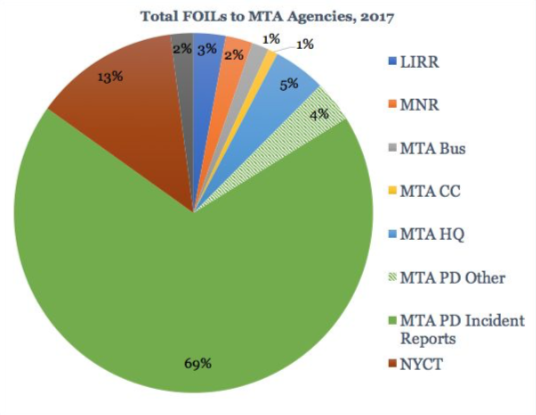Testimony to NYC Council on MTA Reform for Fast Forward Plan Hearing
Testimony to the City Council Committee on Transportation Regarding Oversight of the MTA Fast Forward Plan
December 4, 2018
Reinvent Albany is a government watchdog organization which advocates for open and accountable government, including for state authorities like the Metropolitan Transportation Authority (MTA). With support from TransitCenter, we are preparing a series of reports and recommendations for improving the MTA’s governance and transparency. We think the City Council will find them useful.
In a November 18, 2018 analysis of the 7 Train CBTC, we called on MTA to prepare a “lessons learned report” from a marquee signals contract that was late and over budget. In an October 28, 2018 report, we made specific recommendations for how MTA can fix its fragmented, dysfunctional Freedom of Information Law (FOIL) process. Lastly, in a July 17, 2018 letter and accompanying report, we were among eight groups asking the MTA Board to make specific changes to its conflict of interest rules to reduce the potential for pay-to-play and influence peddling. Below are short summaries of three reports.
1. Implementation of Communications-Based Train Control (CBTC) on the Flushing/7 Train – November 2018
Reinvent Albany conducted an analysis of the MTA’s work to implement Communications-Based Train Control (CBTC) on the Flushing/Number 7 train, finding that the project was 5 years late and $157 million over budget. The analysis tracks the project’s origins in the MTA’s capital plans, noting that design work for the project began in 2003. The contract was ultimately awarded to Thales in 2010, and is expected to be completed in December of 2018. The MTA’s Capital Program Oversight Committee (CPOC) received repeated warnings from MTA staff regarding significant software and track availability delays, yet it is not clear if the MTA has analyzed implementation of this project.
Recommendation: Reinvent Albany called upon the MTA to release a “lessons learned” report about this project, given its plans to modernize the subway’s signal systems systemwide with CBTC.
Report available at:
2. FOIL That Works: Fixing the MTA’s Fragmented, Dysfunctional Freedom of Information Process – October 2018
In an in-depth report, Reinvent Albany examined the MTA’s Freedom of Information Law (FOIL) practices, and found that tMTA received nearly 9,000 requests in 2017 (see chart below), with requests for information handled differently between its eight separate agencies. New York City Transit still responds to many FOIL requests with paper letters instead of by email. Complicated requests can take over a year to fill, and most FOILers don’t have the legal resources to take the MTA to court to speed things up. FOIL requests might be deemed “closed” by agency staff, but this does not mean the requestor actually received the information he or she was looking for.
The report also found that the MTA doesn’t segregate information requests the way it should. As shown in the chart above, two-thirds of the MTA’s FOIL requests – more than 6,000 – were for police incident reports in 2017.
Recommendations:
1. The MTA should adopt an Open FOIL platform using best practices from the Port Authority and NYC Open Records Portal. This will vastly increase the efficiency of the MTA’s FOIL process, produce significant cost savings, and better serve the public.
2. The MTA should create an in-house portal for requesting MTA Police Incident Reports, using the models from the NYS DMV and Pennsylvania State
Police, allowing the public to privately request incident reports online.
These recommendations are supported by 14 organizations, representing environmental, transit, good government, and freedom of information groups.
Report available at:
https://reinventalbany.org/2018/11/flushing-7-train-cbtc-signals-late-and-over-budget -what-lessons-will-the-mta-learn-for-systemwide-modernization/
Letter available at: https://reinventalbany.org/2018/10/fourteen-city-state-and-national-groups-urge-mta -to-fix-dysfunctional-foil-process/
3. MTA Conflicts of Interest Rules – July 2018
Reinvent Albany and other watchdog groups called on the MTA Audit Committee to put forward eight recommendations on conflicts of interest and ethics reform for full MTA Board approval, also releasing an analysi of the MTA’s Ethics Codes.
Recommendations:
- Amend the Board Code of Ethics to ban outside income for the MTA Chairman/CEO – whether compensated or not – and at a minimum, appointed, non-civil service staff, and affirm by board vote that the Chairman/CEO is the head of the agency – whether or not receiving a salary – and is subject to all Public Authorities Law, Public Officers Law (Sections 73, 73-a and 74) and MTA internal ethics policies requirements covering heads of agencies, not just those for per diem board members;
- Amend the Board Code of Ethics to require notification to the full MTA Board of any board member’s and the Chairman/CEO’s potential conflicts of interest, including requiring a public record be kept via Board and/or Committee meeting minutes, as recommended by the Authorities Budget Office;
- Amend the All-Agency and Board Codes of Ethics to eliminate double standards between board and/or management and employees regarding accepting directorships and attendance at prohibited-source sponsored events.
- Amend the Board Code of Ethics to ban campaign contributions to the governor from board members’ businesses and family, and affirm by board vote that campaign contributions to the governor from MTA board members are banned, as stipulated in the MTA Board Code of Ethics.
Report and letter available at:

